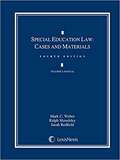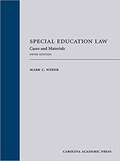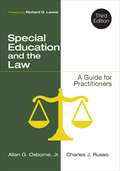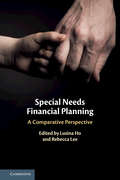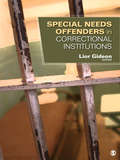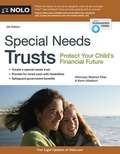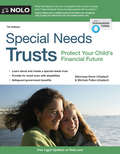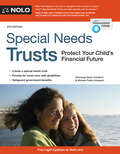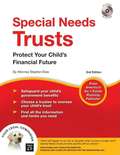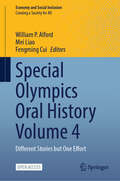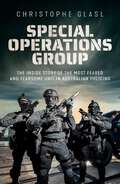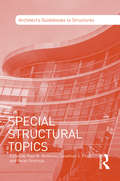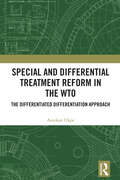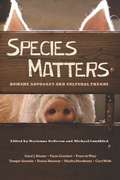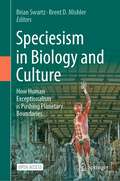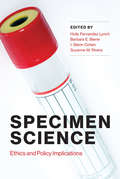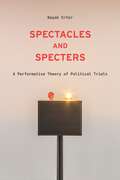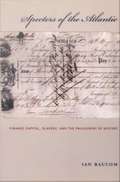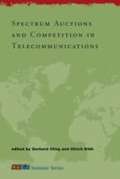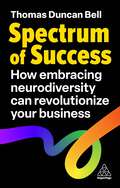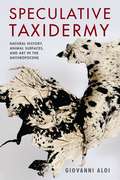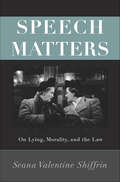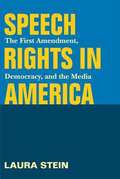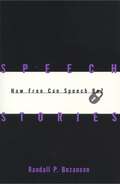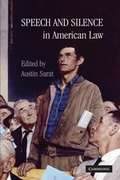- Table View
- List View
Special Education Law: Cases and Materials
by Mark C. Weber Ralph Mawdsley Sarah RedfieldThis book contains relevant statutory excerpts and carefully edited reports of the leading special education cases, together with extensive explanatory materials and provocative questions for class discussion. <p><p> The book also features practical exercises for home assignments or in-class projects. Two of the co-authors teach in law schools and have deep experience in special education law as well as allied subjects such as constitutional law, administrative law, civil procedure, federal courts, and general school law. Their background enables them to discuss the special education topics thoroughly and to draw connections to other parts of the law school curriculum. The third co-author, who is also a lawyer, teaches educational administration as well as special education law; that background enables him to add lessons on the real-world impact of the law on the daily work of the schools. <p><p> The Fourth Edition includes new cases on eligibility, damages, and other topics, as well as coverage of the new Infant and Toddler Program regulations.
Special Education Law: Cases and Materials
by Mark C. WeberThis new fifth edition contains case text as well as extensive analysis and commentary for Endrew F. v. Douglas County and Frye v. Napoleon Community Schools. It also includes carefully edited reports of a host of other recent court decisions, including <p><p> • Krawietz v. Galveston Independent, Spring Branch v. O.W., and P. v. West Hartford on child-find duties,<p> • Independent School District No. 283 v. E.M.D.H. on evaluation,<p> • D.L. v. St. Louis on services for children with autism spectrum disorder,<p> • Albright v. Mountain Home on IEPs,<p> • L.H. v. Hamilton County and C.D. v. Natick on least restrictive environment, and<p> • A.G. v. Paradise Valley and Stanek v. St. Charles on Section 504-ADA claims. <p><p> At the same time, the book maintains comprehensive coverage of legal issues affecting schools and students from the infant and toddler program through higher education. <p><p>The new edition gives special attention to claims concerning charter schools, police intervention issues, education of children in juvenile detention, and private school students. The text includes provocative questions for discussion as well as practical exercises for students to apply their knowledge and skills.
Special Education and the Law: A Guide for Practitioners (Third Edition)
by Allan G. Osborne Charles J. RussoThis essential guide translates legalese into your language and allows the special education teacher to focus on your core competency: providing excellent education for students with special needs.
Special Needs Financial Planning: A Comparative Perspective
by Rebecca Lee Lusina HoCountries around the world are facing pressing needs to enhance financial planning mechanisms for individuals with cognitive impairment. The book provides the first comparative study of the three most common of such mechanisms in Asia and the West, namely guardianship, enduring/lasting powers of attorney, and special needs trusts. It involves not only scholarly overviews of the mechanisms in the jurisdictions studied, but also thorough, structured and critical reviews of their operational experiences. This book will have broad appeal to scholars, students, law and policy makers and practitioners in the fields of mental disability, healthcare and elder law. It is widely recognised in the field that books like this one are needed. This book will also be of interest to undergraduate and graduate students in mental health, disability law and elder law.
Special Needs Offenders in Correctional Institutions
by Lior GideonEffective treatment and preparation for successful reintegration can be better achieved if the needs and risks of incarcerated offenders are taken into consideration by correctional practitioners and scholars. Special Needs Offenders in Correctional Institutions offers a unique opportunity to examine the different populations behind bars (e.g. chronically and mentally ill, homosexual, illegal immigrants, veterans, radicalized inmates, etc.), as well as their needs and the corresponding impediments for rehabilitation and reintegration. Author Lior Gideon takes a rehabilitative and reiterative approach to discuss and differentiate between the needs of these various categories of inmates, and provides in depth discussions-not available in other correctional texts-about the specific needs, risks and policy recommendations when working with present-day special needs offenders. Each chapter is followed by suggested readings and relevant websites that will enable readers to further enhance understanding of the issues and potential solutions discussed in the chapter. Further, each chapter has discussion questions specifically designed to promote class discussions. The text concludes with a theoretical framework for future policy implications and practices.
Special Needs Trusts
by Stephen EliasCreate a special needs trust for a loved one's care and get peace of mind If you care for a child or other loved one with a disability, you've no doubt thought about what will happen when you're no longer able to give that care. Fortunately, there's a simple solution to this dilemma create a "special needs trust." Special Needs Trusts shows you how to leave any amount of money to your disabled loved one without jeopardizing government benefits. It provides plain English information and forms that let you create a special needs trust by modifying your will or living trust document. Funds in a special needs trust can make a big difference in quality of life by paying for: . annual independent check ups . personal care attendant or escort . vehicles and transportation . insurance . rehabilitation . essential dietary needs . materials for recreation . trips or vacations . entertainment . athletic training or competitions . and much more. Special Needs Trusts also provides a formal letter to the trustee, which explains this very important role, and a personal letter to the trustee, which provides crucial information about your loved one. This edition has been thoroughly revised to reflect the latest changes in the law, including updated eligibility requirements for government benefits, current resources, and an experienced perspective about when to make a special needs trust on your own and when to seek the services of an attorney. Forms are available to download at nolo.com.
Special Needs Trusts: Protect Your Child's Financial Future
by Kevin Urbatsch Michele Fuller-UrbatchSpecial Needs Trusts shows you how to leave any amount of money to your disabled loved one -- without jeopardizing government benefits. It provides plain-English information and forms you need to create a special needs trust. Funds in a special needs trust can make a big difference in quality of life by paying for: annual independent check-ups personal care attendant or escort vehicles and transportation insurance rehabilitation essential dietary needs materials for recreation trips or vacations entertainment athletic training or competitions, and much more. Special Needs Trusts also provides a formal letter to the trustee, which explains this very important role, and a personal letter to the trustee, which provides crucial information about your loved one. Author Kevin Urbastch gives you an experienced perspective about when to make a special needs trust on your own and when to seek the services of an attorney. This edition has been thoroughly revised to provide: current eligibility requirements for government benefits helpful resources a new chapter on letters of intent a new chapter on ABLE accounts
Special Needs Trusts: Protect Your Child's Financial Future
by Kevin Urbatsch Michele Fuller-UrbatchLeave money to a loved one with a disability—without losing benefits Use a special needs trust to provide financial security for your child (or anyone) with a disability, without jeopardizing important government benefits. Funds in a special needs trust do not count against eligibility for benefits and can be used to improve the quality of your child’s life. This book provides everything you need to know about special needs trusts—whether you make one yourself or have an attorney draft one for you. The authors explain: how special needs trusts work the trustee’s role ways to pass important information to successor trustees the pros and cons of joining a pooled trust, and creating special needs trust with or without a lawyer. This edition is thoroughly updated and includes new chapters on ABLE accounts and letters of intent. All forms are downloadable through a special link in the book.
Special Needs Trusts: Protect Your Child's Financial Future (2nd edition)
by Stephen EliasIf you care for a child or other loved one with a disability, you've no doubt thought about what will happen when you're no longer able to give that care. Fortunately, there's a simple solution to this dilemma -- create a "special needs trust." Special Needs Trusts shows you how to leave any amount of money to your disabled loved one, without jeopardizing government benefits. It provides plain-English information and forms that let you create a special needs trust by modifying your will or living trust document.
Special Olympics Oral History Volume 4: Different Stories but One Effort (Economy and Social Inclusion)
by William P. Alford Mei Liao Fengming CuiThis open access book commemorates the 50th anniversary of the Special Olympics (1968-2018). This is the fourth volume of the first oral history about people with intellectual disabilities in the world and the first oral history of persons with disabilities in China. This book also includes stories from teachers, coaches, school principals, parent leaders, coworkers, and volunteers. They share their personal views on people with intellectual disabilities. The book also includes observations and records of what people with intellectual disabilities and others do on a certain day. It uses sociology and oral history to give an objective, neutral account of the lives of people with intellectual disabilities in China. It helps readers understand how the Special Olympics movement, public policies, social environment, and self-cognition affect people with intellectual disabilities.
Special Operations Group
by Christophe GlaslThe Special Operations Group are ultra-fit, highly trained officers brought in to do the jobs other police cannot. Since he was a nineteen-year-old recruit with Victoria Police, Chris Glasl aspired to join this elite group - the SOG were untouchable, indestructible and bonded so closely together they were a brotherhood like no other. But when Chris achieved his dream in 1994, the brotherhood he thought he was joining didn't exist.Special Operations Group is Chris's story of his life in the SOG - where solidarity, camaraderie and loyalties were undermined by bullying, bastardisation, drug use, lies and betrayal. It is a raw, behind-the-scenes look at what went on at the SOG, and a gripping account of major jobs he attended: fatal shootings, a triple murder, a 100-million-dollar drug bust and the Port Arthur massacre, to name just a few. For Chris, eventually the work, culture and his struggle with drugs and alcohol took its toll. This is a white-knuckle ride of a story as he tells it like it was and comes to grips with his past.
Special Structural Topics (Architect's Guidebooks to Structures)
by Paul W. McMullin Jonathan S. Price Sarah SimchukSpecial Structural Topics covers specialty structural situations for students and professional architects and engineers, such as soil mechanics, structural retrofit, structural integrity, cladding design, blast considerations, vibration, and structural sustainability. As part of the Architect’s Guidebooks to Structures series, it provides a comprehensive overview using both imperial and metric units of measurement with more than 150 images. As a compact summary of key ideas, it is ideal for anyone needing a quick guide to specialty structural considerations.
Special and Differential Treatment Reform in the WTO: 'The Differentiated Differentiation Approach
by Aniekan UkpeThis book proposes a new approach to differentiating between developing countries in the context of special and differential treatment (SDT) in the World Trade Organisation.Offering unique insights into SDT reform in the WTO, the book proposes the method of differentiated differentiation and demonstrates its operationalization using the WTO Customs Valuation Agreement. Through identifying key indicators to categorize constraints faced by developing countries, the book establishes objective criteria to depoliticize access to SDT. Promoting a case-by-case approach, the book also employs a statistics-based score procedure to determine a threshold for graduating countries out of SDT. Through flexible tracking and evidence-based arguments, the book provides a transitional method of reform which maintains full compliance with WTO members’ obligations.The book will be of importance to academics and students of international law, especially those with an interest in international trade law and the WTO, as well as legal professionals and policymakers.
Species Matters: Humane Advocacy and Cultural Theory
by Michael Lundblad Marianne DeKovenWhy has the academy struggled to link advocacy for animals to advocacy for various human groups? Within cultural studies, in which advocacy can take the form of a theoretical intervention, scholars have resisted arguments that add "species" to race, class, gender, sexuality, disability, and other human-identity categories as a site for critical analysis. Species Matters considers whether cultural studies should pay more attention to animal advocacy and whether, in turn, animal studies should pay more attention to questions raised by cultural theory. The contributors to this volume explore these issues particularly in relation to the "humane" treatment of animals and various human groups and the implications, both theoretical and practical, of blurring the distinction between "the human" and "the animal." They address important questions raised by the history of representing humans as the only animal capable of acting humanely and provide a framework for reconsidering the nature of humane discourse, whether in theory, literary and cultural texts, or current advocacy movements outside of the academy.
Speciesism in Biology and Culture: How Human Exceptionalism is Pushing Planetary Boundaries
by Brent D. Mishler Brian SwartzThis open access book explores a wide-ranging discussion about the sociopolitical, cultural, and scientific ramifications of speciesism and world views that derive from it. In this light, it integrates subjects across the natural sciences, social sciences, and humanities. The 21st-century western world is anthropocentric to an extreme; we adopt unreasonably self-centered and self-serving ideas and lifestyles. Americans consume more energy resources per person than most other nations on Earth and have little concept of how human ecology and population biology interface with global sustainability. We draw upon religion, popular culture, politics, and technology to justify our views and actions, yet remain self-centered because our considerations rarely extend beyond our immediate interests. Stepping upward on the hierarchy from “racism,” “speciesism” likewise refers to the view that unique natural kinds (species) exist and are an important structural element of biodiversity. This ideology manifests in the cultural idea that humans are distinct from and intrinsically superior to other forms of life. It further carries a plurality of implications for how we perceive ourselves in relation to nature, how we view Judeo-Christian religions and their tenets, how we respond to scientific data about social problems such as climate change, and how willing we are to change our actions in the face of evidence.
Specimen Science: Ethics and Policy Implications (Basic Bioethics)
by Holly Lynch Barbara Bierer I. Cohen Suzanne RiveraLegal, regulatory, and ethical perspectives on balancing social benefit and human autonomy in research using human biospecimens.Advances in medicine often depend on the effective collection, storage, research use, and sharing of human biological specimens and associated data. But what about the sources of such specimens? When a blood specimen is drawn from a vein in your arm, is that specimen still you? Is it your property, intellectual or otherwise? Should you be allowed not only to consent to its use in research but also to specify under what circumstances it may be used? These and other questions are at the center of a vigorous debate over the use of human biospecimens in research. In this book, experts offer legal, regulatory, and ethical perspectives on balancing social benefit and human autonomy in biospecimen research.After discussing the background to current debates as well as several influential cases, including that of Henrietta Lacks, the contributors consider the rights, obligations, risks, and privacy of the specimen source; different types of informed consent under consideration (broad, blanket, and specific); implications for special patient and researcher communities; and the governance of biospecimen repositories and the responsibilities of investigators.ContributorsRebecca A. Anderson, Heide Aungs, Avery Avrakotos, Mark Barnes, Jill Barnholtz-Sloan, Benjamin Berkman, Barbara E. Bierer, Mark A. Borreliz, Jeffrey R. Botkin, Dan Brock, Ellen Wright Clayton, I. Glenn Cohen, Lisa Eckstein, Barbara J. Evans, Emily Chi Fogler, Nanibaa' A. Garrison, Pamela Gavin, Aaron J. Goldenberg, Christine Grady, Kate Gallin Heffernan, Marylana Saadeh Helou, Sara Chandros Hull, Elisa A. Hurley, Steven Joffe, Erin P. Johnson, Julie Kaneshiro, Aaron S. Kesselheim, Isaac Kohane, David Korn, Russell Korobkin, Bernard Lo, Geoffrey Lomax, Kimberly Hensle Lowrance, Holly Fernandez Lynch, Bradley A. Malin, Karen J. Maschke, Eric M. Meslin, P. Pearl O'Rourke, Quinn T. Ostrom, David Peloquin, Rebecca Pentz, Jane Perlmutter, Ivor Pritchard, Suzanne M. Rivera, Erin Rothwell, Andrew P. Rusczek, Rachel E. Sachs, Carol Weil, David Wendler, Benjamin Wilfond, Susan M. Wolf
Spectacles and Specters: A Performative Theory of Political Trials
by Başak ErtürWINNER, SLSA SOCIO-LEGAL THEORY AND HISTORY PRIZESHORTLISTED, THE HART-SLSA BOOK PRIZESpectacles and Specters draws on theories of performativity to conceptualize the entanglements of law and political violence, offering a radical departure from accounts that consider political trials as instrumental in exercising or containing political violence. Legal scholar Başak Ertür argues instead that making sense of the often incalculable interpenetrations of law, politics, and violence in trials requires shifting the focus away from law’s instrumentality to its performativity.Ertür develops a theory of political trials by reconstructing and building on a legacy of critical thought on Nuremberg in close engagement with theories of performativity. She then offers original case studies that introduce a new perspective by looking beyond the Holocaust trials, to the Armenian genocide and its fragmentary legal aftermaths. These cases include the 1921 trial of Soghomon Tehlirian, the 2007-21 Hrant Dink Murder Trial, and the 2015 case before the European Court of Human Rights concerning the denial of the Armenian genocide. Enabling us to capture the various modalities in which the political emerges in, through and in relation to legal forms on the stage of the trial, this focus on law’s performativity also allows us to account for how sovereign schemes can misfire and how trials can come to have unintended political lives and afterlives. Further, it reveals how law is entangled with and perpetuates certain histories of violence, rather than simply ever mastering these histories or providing closure.
Specters of the Atlantic: Finance Capital, Slavery, and the Philosophy of History
by Ian BaucomIn September 1781, the captain of the British slave ship Zong ordered 133 slaves thrown overboard, enabling the ship's owners to file an insurance claim for their lost "cargo. " Accounts of this horrific event quickly became a staple of abolitionist discourse on both sides of the Atlantic. Ian Baucom revisits, in unprecedented detail, the Zong atrocity, the ensuing court cases, reactions to the event and trials, and the business and social dealings of the Liverpool merchants who owned the ship. Drawing on the work of an astonishing array of literary and social theorists, including Walter Benjamin, Giovanni Arrighi, Jacques Derrida, and many others, he argues that the tragedy is central not only to the trans-Atlantic slave trade and the political and cultural archives of the black Atlantic but also to the history of modern capital and ethics. To apprehend the Zong tragedy, Baucom suggests, is not to come to terms with an isolated atrocity but to encounter a logic of violence key to the unfolding history of Atlantic modernity. Baucom contends that the massacre and the trials that followed it bring to light an Atlantic cycle of capital accumulation based on speculative finance, an economic cycle that has not yet run its course. The extraordinarily abstract nature of today's finance capital is the late-eighteenth-century system intensified. Yet, as Baucom highlights, since the late 1700s, this rapacious speculative culture has had detractors. He traces the emergence and development of a counter-discourse he calls melancholy realism through abolitionist and human-rights texts, British romantic poetry, Scottish moral philosophy, and the work of late-twentieth-century literary theorists. In revealing how the Zong tragedy resonates within contemporary financial systems and human-rights discourses, Baucom puts forth a deeply compelling, utterly original theory of history: one that insists that an eighteenth-century atrocity is not past but present within the future we now inhabit.
Spectrum Auctions and Competition in Telecommunications
by Gerhard Illing Ulrich KlühThis book collects essays on this topic by leading analysts of telecommunications and the European auction experience, all but one presented at a November 2001 CESifo conference; comments and responses are included as well, to preserve some of the controversy .
Spectrum of Success: How Embracing Neurodiversity Can Revolutionize Your Business
by Thomas Duncan BellUnlock the full potential of neurodiverse people and create a more inclusive, supportive and adaptive business with Spectrum of Success.20% of the global population is neurodivergent, but the world isn't built for them. Their incredible talent becomes wasted when they don't have the opportunity to succeed. Spectrum of Success uncovers how we can create a more accessible work culture that champions neurodiversity and promotes allyship and collaboration.Through fascinating research and inspiring interviews with neurodiverse business leaders, mental health expert Thomas Duncan Bell uncovers how we can support and champion neurodiversity at work and beyond. Drawing upon his own experiences with ADHD and bipolar disorder, the book also offers an enlightening insight into how neurodiverse individuals can thrive in the modern world.
Speculative Taxidermy: Natural History, Animal Surfaces, and Art in the Anthropocene (Critical Life Studies)
by Giovanni AloiTaxidermy, once the province of natural history and dedicated to the pursuit of lifelike realism, has recently resurfaced in the world of contemporary art, culture, and interior design. In Speculative Taxidermy, Giovanni Aloi offers a comprehensive mapping of the discourses and practices that have enabled the emergence of taxidermy in contemporary art. Drawing on the speculative turn in philosophy and recovering past alternative histories of art and materiality from a biopolitical perspective, Aloi theorizes speculative taxidermy: a powerful interface that unlocks new ethical and political opportunities in human-animal relationships and speaks to how animal representation conveys the urgency of addressing climate change, capitalist exploitation, and mass extinction.A resolutely nonanthropocentric take on the materiality of one of the most controversial mediums in art, this approach relentlessly questions past and present ideas of human separation from the animal kingdom. It situates taxidermy as a powerful interface between humans and animals, rooted in a shared ontological and physical vulnerability. Carefully considering a select number of key examples including the work of Nandipha Mntambo, Maria Papadimitriou, Mark Dion, Berlinde De Bruyckere, Roni Horn, Oleg Kulik, Steve Bishop, Snæbjörnsdóttir/Wilson, and Cole Swanson, Speculative Taxidermy contextualizes the resilient presence of animal skin in the gallery space as a productive opportunity to rethink ethical and political stances in human-animal relationships.
Speech Matters: On Lying, Morality, and the Law (Carl G. Hempel Lecture Series #4)
by Seana Valentine ShiffrinTo understand one another as individuals and to fulfill the moral duties that require such understanding, we must communicate with each other. We must also maintain protected channels that render reliable communication possible, a demand that, Seana Shiffrin argues, yields a prohibition against lying and requires protection for free speech. This book makes a distinctive philosophical argument for the wrong of the lie and provides an original account of its difference from the wrong of deception.Drawing on legal as well as philosophical arguments, the book defends a series of notable claims—that you may not lie about everything to the "murderer at the door," that you have reasons to keep promises offered under duress, that lies are not protected by free speech, that police subvert their mission when they lie to suspects, and that scholars undermine their goals when they lie to research subjects.Many philosophers start to craft moral exceptions to demands for sincerity and fidelity when they confront wrongdoers, the pressures of non-ideal circumstances, or the achievement of morally substantial ends. But Shiffrin consistently resists this sort of exceptionalism, arguing that maintaining a strong basis for trust and reliable communication through practices of sincerity, fidelity, and respecting free speech is an essential aspect of ensuring the conditions for moral progress, including our rehabilitation of and moral reconciliation with wrongdoers.
Speech Rights in America: The First Amendment, Democracy, and the Media
by Laura SteinThe First Amendment is the principle guarantor of speech rights in the United States, but the Supreme Court's interpretations of it often privilege the interests of media owners over those of the broader citizenry. In Speech Rights in America, Laura Stein argues that such rulings alienate citizens from their rights, corrupt the essential workings of democracy, and prevent the First Amendment from performing its critical role as a protector of free speech. Drawing on the best of the liberal democratic tradition, Stein demonstrates that there is a significant gap between First Amendment law and the speech rights necessary to democratic communication, and proposes an alternative set of principles to guide future judicial, legislative, and cultural policy on old and new media.
Speech Stories: How Free Can Speech Be?
by Randall P. BezansonWhen we talk about what "freedom of speech" means in America, the discussion almost always centers on freedom rather than speech. Taking for granted that speech is an unambiguous and stable category, we move to considering how much freedom speech should enjoy. But, as Randall Bezanson demonstrates in Speech Stories, speech is a much more complicated and dynamic notion than we often assume. In an age of rapidly accelerated changes in discourse combined with new technologies of communication, the boundaries and substance of what we traditionally deem speech are being reconfigured in novel and confusing ways. In order to spark thought, discussion, and debate about these complexities and ambiguities, Bezanson probes the "stories" behind seven controversial free speech cases decided by the Supreme Court. These stories touch upon the most controversial and significant of contemporary first amendment issues: government restrictions on hate speech and obscene and indecent speech; pornography and the subordination of women; the constitutionality of campaign finance reform; and the treatment to be accorded new technologies of communication under the Constitution. The result is a provocative engagement of the reader in thinking about the puzzles and paradoxes of our commitment to free expression.
Speech and Silence in American Law
by Austin SaratRather than abstract philosophical discussion or yet another analysis of legal doctrine, Speech and Silence in American Law seeks to situate speech and silence, locating them in particular circumstances and contexts and asking how context matters in facilitating speech or demanding silence. To understand speech and silence we have to inquire into their social life and examine the occasions and practices that call them forth and that give them meaning. Among the questions addressed in this book are, Who is authorized to speak? And what are the conditions that should be attached to the speaking subject? Are there occasions that call for speech and others that demand silence? What is the relationship between the speech act and the speaker? Taking these questions into account helps readers understand what compels speakers and what problems accompany speech without a known speaker, allowing us to assess how silence speaks and how speech renders the silent more knowable.
